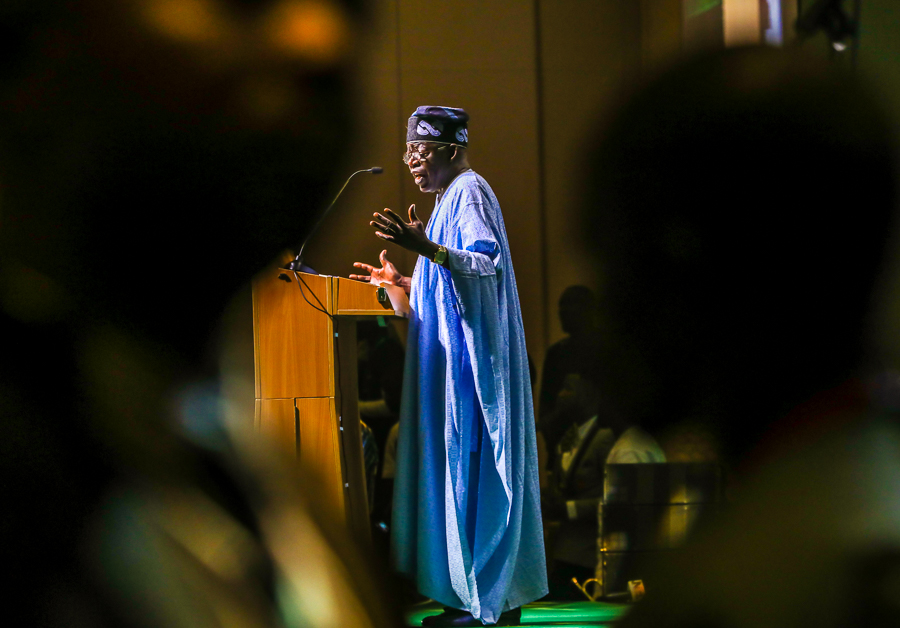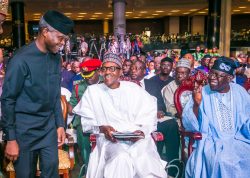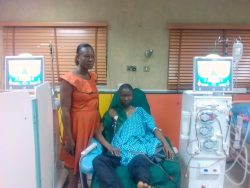INVESTING IN PEOPLE:
A MORE ACCURATE PERSPECTIVE
10th ANNUAL BAT COLLOQUIUM
ADDRESS
It is indeed a high moment when the President alters his schedule to participate in this event. I am humbled and honored by your presence today, Mr. President.
May the collective dream of progressive governance and positive reform in Nigeria never fade and always be the vision that guides us.
Despite the hurdles and difficulties that come, let this noble effort become our national reality for the sake of those amongst us most in need, for the sake of the present generation and for the sake of generations yet to come.
I wish to also thank your Vice President whose dedication and ability so well serve you and your administration. Without him and his team of organizers, this event would not have been possible.
I thank Governor Ambode for hosting us so graciously for the true character of Lagos is generosity of spirit as well as the spirit of excellence.
My greetings to everyone in this hall and outside of it as well.
I beg that you forgive my abruptness with usual protocol. I do so not to slight anyone. If you must blame anything for my abruptness, please direct your blame at the advancing hour (of the day).
The speakers have been thoughtful and inspiring. There is not much I can add; but the nature of the day compels that I offer some thoughts regarding the subject at hand.
I shall labor to meet this obligation in as short a time as possible.
The topic “Investing in People” is timely, given both the current arc of our national political and economic evolution and given the recent discussion of this topic generated by a famous philanthropist who recently visited our shores.
How we invest today determines the quality of our tomorrow. We start from the realization that our resources are as scarce and finite as they are valuable.
Thus, we dare not waste them for they are almost always inadequate and never in surplus when measured against all the beneficial things we desire to do for our society.
In short, waste is the mother of want and misuse the father of lack.
Mis-investment comes with steep opportunity costs. The misapplication of one naira means one naira less for a more appropriate investment. In a way, this represents a double loss.
Here I shall depart from the mainstream approach that draws a line between capital investment and what many people now call human capital investment.
We now speak of the two as if they were conflicting opposites, inherently at odds with each other.
This is not a wise road to travel. Instead, we must think of them as points along the same continuum. Instead of being opposites, they are in fact similar and complementary, the one to the other.
Human capital investment connotes expenditures that improve the inner capacity or wellbeing of a person or populace. Things such as education and health care come quickly to mind.
Traditional capital investment connotes expenditure on instrumentalities external to a person that improves his ability to further improve his productivity or lifestyle. These are things like roads and power.
In between, lie things like potable water which has clear human capital as well as traditional capital investment dividends.
In my mind, both forms of investment are related; both ultimately benefit the people. No right-minded government builds a road but forbids travelers its usage. Better roads lessen accidents, reduce travel time and cut costs of business and goods.
Electric power is not generated merely for its own sake but so people can work more efficiently and live in greater comfort.
It allows students to read into the night, learning more and learning better; it permits hospitals to utilize equipment and procedures that can save thousands of lives otherwise lost.
It allow factories to hum 24 hours a day, producing jobs and goods that increase the wealth and welfare of a people.
Thus, investing in roads is more an investment in the people who use them than an investment in the gravel and tar that comprise the paved way.
Investment in power is at its essence more an investment in the people who will rely on it to improve their activities and efforts than it is merely an investment in turbines and other physical equipment.
This is like the chicken and egg question. When asked which one comes first, the only reasonable response is to say that “the one produces the other.”
Thus, our task is not to draw an artificial boundary between the two types of investment.
Our task must be to re-integrate these two components into a coherent plan where finite resources are allocated in ways that respond to present urgencies yet also answer the burning question of how to best achieve durable economic growth for all segments of society.
It would be the height of cruelty to tell a man dying of thirst that he must wait until we build him a perfect well before we can give him all the water he will ever want.
He needs but a cup to drink. But he needs it here and now. Waiting is not a viable option. Thus, we must hurry the cup unto him.
Only once that is done, do we work on constructing a well so that he may never again fall prey to such a danger.
It is at this point that we must draw a different conceptual distinction than the one normally drawn between physical capital and human capital investment.
I posit that we profit more by drawing a conceptual distinction between the type of social investment that helps us manage or mitigate poverty as compared to that investment which leads to economic growth that reduces if not eliminates poverty at its very root.
Poverty mitigating investment may soften the harshest blows of penury but such investment offers no great escape from it.
For example, every human being has a right to health care. Giving such care is a moral duty of any compassionate government. Yet, however healthy that person may become as a result, this does not mean his economic situation will necessarily improve because of better health.
The same goes for education. We already have many intelligent graduates whose abilities did not meet a job because there simply were no jobs to meet.
Over the decades, we have built legions of people who are well educated but not for this economy and this job market.
We must remember that education is not an abstraction. While education is a virtue in itself, it also must have practical utility or else it will become a discredited, even detested thing.
A key purpose of education is to provide a person the skills required to earn a living within the context of a given economic environment. There is no pressing need to teach a desert nomad to scuba dive or to instruct a fisherman in the Delta the intricacies of hunting a polar bear or riding a camel.
Education must be wedded to the economy that now exists as well as to the economy that shall be in the foreseeable future.
The able-bodied Africans who braved the harsh desert crossing of the Sahara only to further brave the death waters of the Mediterranean Sea do so not in search for better healthcare or even education for the most part.
They do so in search of meaningful work, the money, as well as the sense of independent existence and self worth that such work can bring.
This is the compelling force.
Thus, any responsible government and society must heavily invest in those things that promise economic prosperity and employment. This is the primary challenge government must meet.
While government cannot ignore investments that lessen the grimmest effects of poverty, we also must face the hard fact that a nation cannot truly defeat poverty without generating broadly-shared economic growth through prudent investment in infrastructure, industrial development, and agricultural modernization.
My life has been dedicated to the proposition that Nigeria can grow and overcome poverty, not just live with a less brutal version of poverty.
After 66 years, I am not about to change my walk or change my talk at this point.
There is something we must examine more closely. The chorus of Western-appointed experts sings that we must target certain levels of expenditure on various programs to reach sustainable growth.
Few people dare question the veracity of this claim, the soundness of this song. However, the question of cause and effect casts a long shadow over the entire procession.
Is it true that sustaining certain levels of expenditures will bring economic development?
Or is the deeper, more fundamental truth that economic development will generate heightened levels of social expenditure?
Economic history points to the latter explanation as the most viable road to durable national improvement.
We must define our path to development correctly if we are to have any chance of following that path faithfully.
Yes, our society must invest sufficiently in lessening the most brutal aspects of poverty. We cannot allow people to be broken by poverty unattended.
However, the great escape from poverty comes not by making poverty more livable. Our escape comes by burying poverty under an edifice of wealth creation and equitable distribution of said wealth.
This is only done by economic growth. This is how England, America and China did it.
As these nations represent the past, present and immediate future of economic greatness, we should learn more from what they did for themselves than from what they say we should do.
Here, I offer a few suggestions that may help blunt the effects of poverty while ensuring sustained growth to increase our national standard of living. We must:
- Stimulate the economy by investment in new generation technology and its resultant infrastructure. This must be at the heart of our national infrastructure planning.
- Encourage private sector investment in labor intensive industries by reducing barriers to entry in these sectors and by helping such enterprises to be cost competitive. This must be the core of our national industrial plan.
- Continue massive investment in agricultural output and move to establish commodity boards and commodity exchanges so that farmers will be assured of a livable income. Farm mortgages should be more accessible to give farmers a pathway to credit to procure better equipment and inputs.
- Help the elderly. We must continue to improve the pension system. This will reduce poverty among the elderly while generating additional economic activity through enhanced consumer demand. Moreover, this is the moral thing to do.
- Reform the mortgage system to facilitate credit expansion in a manner that allows the real estate sector to become a key driver of overall economic growth and that opens the door to affordable housing throughout the land.
- Extend school feeding programs into all states.
- Promote judicial reform to insulate jurists and the legal system from corruption. Providing attractive salaries and allowances will make jurists less susceptible to the corrupt temptations and illicit requests that distort the cause of justice.
- Create a blue ribbon panel that identify ways to eliminate all forms of wrongful discrimination in our land. Every Nigerian must be seen as a full and complete Nigerian in whatever part of the nation he may go, no matter what part of the nation from which he came.
Our task is to define ourselves. That means we must think for ourselves.
We are a populous, richly endowed nation. The growth of neighboring countries depends on ours. We hold a responsibility greater than ourselves.
We must act with care. Prudence suggests that we learn our most profound lessons from those nations that have already climbed the highest rungs of the global economic ladder.
As such, this requires that we reject the artificial difference between human capital and normal capital investment.
All investment, if used constructively, benefits the people and thus can be called human capital investment.
As such, the term human capital investment really tells us nothing of value when it comes to defining the correct path to optimal growth.
To forge that path, we must strike the correct balance between investment that mitigates or temporarily relieves the worst of poverty and that type of investment that sparks long-term economic growth that will divorce the poor from poverty.
For our goal is not to endure a less biting poverty. Our goal is to enter into an era of robust prosperity.
This, my friends, my brothers and sisters, my compatriots is the only way I know for our nation to invest in its people so that they may become what God intended them to be























Leave a comment